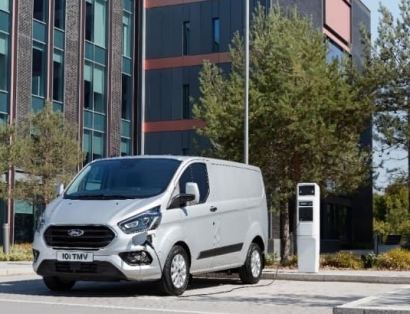
The trial – which was supported by £4.7 million grant from the U.K. government-funded Advanced Propulsion Centre – consisted of 20 Ford Transit Custom Plug-In Hybrid vans covering 240,000 km (150,000 miles) over a 12-month period. The trial sought to test whether businesses could carry out the typical daily duties of their diesel-powered vehicles, while maximizing the use of zero-emissions electric-only mode.
The participants in the trial – Addison Lee Group, Autoglass, British Gas, Clancy Plant, DPD, Heathrow Airport, Interserve, Mears Group, the Metropolitan Police, Morrison Utility Services, RNLI, Royal Mail, Speedy Hire, Sky, Transport for London and Vodafone – represented a cross-section of city-based businesses, and integrated the Ford Transit Custom Plug-In Hybrid vans into their day-to-day operations.
During the trial, 75 percent of the fleet’s mileage in Central London and 49 percent in Greater London was completed using pure electric power. The results highlight that even without a fully established electric vehicle charging network, the hybrid vans were able to reduce tailpipe emissions in the inner city.
“Emissions-free mobility is essential for the future of our cities and their citizens, but we know there are still barriers we face in the move to electrification,” said Mark Harvey, director, Urban Electrified Van program. “We also know that businesses still have legitimate concerns about the range of fully-electric vehicles, as well as their cost-effectiveness and reliability. These trials have helped Ford and its customers to investigate the extent to which PHEVs can help to achieve urban air quality goals, whilst not compromising on productivity.”
Further trials in Cologne and Valencia will provide data from different markets, cities and customer types, and will involve a mix of Transit Custom Plug-In Hybrid vans and new Tourneo Custom Plug-In Hybrid people-movers. These two models are the first vehicles in their classes to offer plug-in hybrid technology, and offer a standard eight-year battery warranty.*
The new vehicles target a zero-emission driving range of 50 kilometres (31 miles), and use a 1.0-litre EcoBoost engine as a range extender for total range exceeding 500 kilometres (310 miles), thus eliminating range anxiety. A compact battery pack located under the vehicle floor can be conveniently charged using a standard 230-volt supply, and is designed so that the interior space and load capacity of the vehicle is not compromised.
“This trial is the first time Ford has given such early prototype vehicles to customers, and we’ve been able to incorporate their feedback directly into the production van,” Harvey said. “The response has been overwhelmingly positive – operators don’t want to give them back.”

